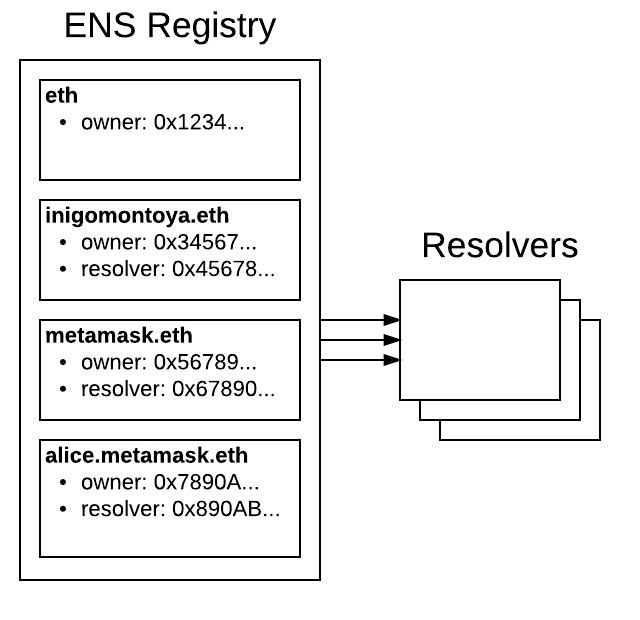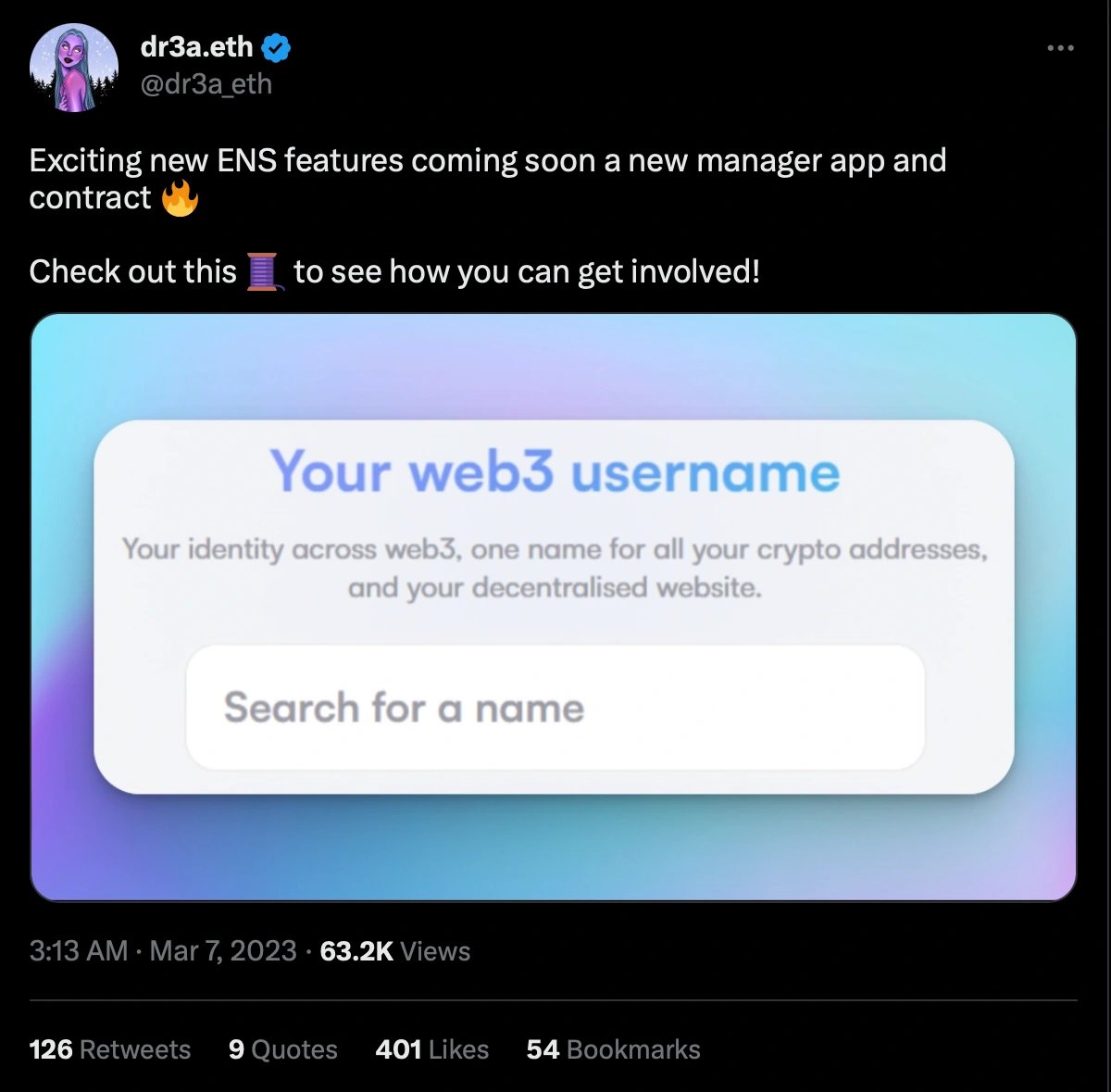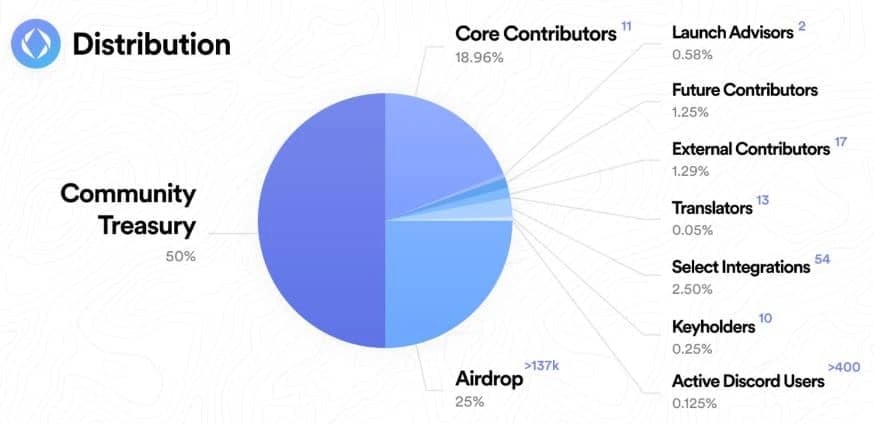Subscribe to wiki
Share wiki
Bookmark
Ethereum Name Service (ENS)
The Agent Tokenization Platform (ATP):Build autonomous agents with the Agent Development Kit (ADK)
0%
Ethereum Name Service (ENS)
Ethereum Name Service (ENS) is an open-source, distributed, and extensible naming system based on the Ethereum blockchain, which allows users to create human-readable names for Ethereum addresses and other content in place of long wallet or service addresses. Additionally, it works similarly to Domain Name System (DNS) and enables a secure and decentralized way to address websites and resources via names rather than numbers.[1][2][8] On secondary markets, anyone can buy and sell ENS domains as NFTs. Each address corresponds to a user's web3 username.
Overview
ENS is an open and decentralized naming and lookup system built on the Ethereum blockchain which helps users to easily transfer funds and also access websites and resources such as smart contracts, wallet addresses, and more with ease using just simple names in place of blockchain or cryptocurrency addresses. It is built on Ethereum’s smart contract, making it more secure, private, and resistant to censorship than the DNS.
Its primary function is to map human-readable names like ‘vitalik.eth’ to machine-readable identifiers such as Ethereum addresses or any other cryptocurrency addresses, content hashes, and metadata. It also helps ‘reverse resolution’, making it possible to associate metadata such as canonical names or interface descriptions with Ethereum addresses.[3][4]
ENS Domain names are Non-Fungible Tokens (NFTs) and follow ERC-721 standards. These domains can be traded on NFT marketplaces such as OpenSea.[5][6] Besides from using just a Domain service, users can even develop a decentralized website using ENS and a decentralized storage system known as Inter Planetary File System.[11]
History
The Ethereum Name Service was first launched by the Ethereum Foundation back in May 2017 and it was introduced by developers Nick Johnson and Alex Van de Sande through the publication of EIP-137. This EIP proposed a protocol that would enable the resolution of human-readable names to service and resource identifiers on the blockchain, allowing users to register .eth domain names and link them to Ethereum resources. Johnson received a grant of USD $1M from the Ethereum Foundation to continue developing ENS due to its early success. [24][36]
In May 2018, it was divided into an independent organization: True Names Ltd. True Names Ltd is a non-profit organization registered and based in Singapore. Since then, the team has achieved several significant milestones such as adding support for Dapps based on distributed file stores like IPFS and Swarm. Additionally, the team expanded the character limit for domain names from exclusively 7-character domains to include 3-6-character domains, which were made available after the initial auction.[24][36]
The governance of ENS is decentralized and community-driven, with decisions made through a combination of informal discussions, community proposals, and on-chain voting using Ethereum's decentralized governance mechanisms, such as the Ethereum Improvement Proposals (EIPs) process. When it was first launched, ENS only supported domain names with the .eth extension. However, over time, the team has expanded its support to include various top-level domain (TLD) names such as .xyz, .kred, .luxe, .club, and .art.[7]
Tech
The registry and resolvers are the ENS's two main parts, which are the two Ethereum smart contracts.
ENS Registry
The registry records the domain name, it consists of a single smart contract that maintains a list of all domains and subdomains, and stores the following vital information about, the owner of the domain, the resolver for the domain, and lastly the caching time-to-live for all records under the domain.
The basic agreement at the center of ENS resolution is the ENS registry. All ENS lookups begin with a registry search. The registry keeps a record of all domains and records the owner, resolver, and TTL. Each domain owner is given the ability to edit this information. [12][13]

The Resolver translates machine-readable addresses into domain names for the users. Any agreement that meets the appropriate standards is qualified to serve as an ENS resolver. For users with simple requirements, like serving a rarely modified address for a name, general-purpose resolver options are available.
In ENS, names are resolved in two steps: first, the user is expected to ask the registry which resolver is in charge of the name, and then they must ask that resolver to respond to their inquiry.[14]
Name Wrapper
On April 7th, 2023, the "EP 3.5" proposal by ENS DAO received 2.6 million supporting votes. Afterwards, it was executed, resulting in upgrades to multiple crucial ENS smart contracts, with a specific emphasis on the "Name Wrapper" system. [33]
The name wrapper smart contract of the Ethereum Name Service (ENS) will transform current ENS domains into ERC-1155 tokens, enabling the creation of subdomains using these tokens. Users will have the capability to set, grant, or revoke permissions for subdomains using a feature called "Fuses" within the Ethereum Name Service (ENS) ecosystem. There will be two types of Fuses: one that allows both the subdomain owner and the parent domain owner to define parameters, and another that only permits parent domain owners to do so. Fuses are designed to be permanent and will only reset after the domain expires. [34][35]
Additionally, alongside the name wrapper, ENS users can anticipate the launch of an updated manager app. [34]

Use Cases
Crypto Transactions
Users who regularly transact through crypto can assign an ENS to their cryptocurrency wallet for ease of use. This minimizes the risks of sending crypto to the wrong addresses often associated with using long and unmemorable addresses.[3]
Multiple Addresses
Users can assign several addresses to their ENS domain, which lets them receive any digital currency or NFT. Due to the contextual functionality of these multi-address domains, users can map both their web3 wallet and their Ethereum wallet to the same domain.[7]
ENS unifies different web services into one source. A user's website is the destination when they enter their ENS domain into a web browser. The exchange or dApp they use will automatically recognize your crypto address when they use their ENS to send or receive cryptocurrency.[11]
Decentralized Websites
Users can also assign ENS domains to decentralized websites, such as those hosted by the InterPlanetary File Systems (IPFS), which requires a higher technical knowledge. Likewise, ENS spreads out DNS capacities by allowing users to register their DNS names.
Those who own a website registered with the DNS domain that hosts their resume and academic certificates can link their DNS-registered website with their ENS domain if they want to maintain one ENS domain name for their website, crypto address, LinkedIn account, Github, and many more.[12]
Immutability
ENS transactions are immutable since they are powered by smart contracts that operate on the Ethereum blockchain. All ENS records are unchangeable and unalterable, similar to blockchain technology.
Monetizing ENS Domains
ENS domains follow the ERC-721 token standard, meaning users can trade, transfer, or use them as collateral to secure a crypto loan. On online markets like OpenSea or Rarible, an individual's domain name is available for purchase or sale as an NFT. On lending services like NFTfi, users can still use it as collateral to secure a loan.[15][16]
ENS Token
ENS is the governance token of Ethereum Name Service and is used to govern the protocol and influence decisions on pricing its .eth addresses and the price oracle. It is an ERC-20 token built on the Ethereum blockchain. Holders of the token can also delegate their tokens to the DAO for voting.[18]
Token Distribution

Early adopters who had previously registered an ENS domain name were airdropped by the ENS token. Users had from November 8th, 2021, through May 4th, 2022, to claim the tokens they were entitled to. The airdrop was used to distribute 25% of the overall supply.
- DAO Community Treasury (50%): 10% at launch, linear vesting over four years.
- Airdrop to.ETH holders (25%)
- Contributors (25%), with four-year linear vesting including:Core Contributors: 18.96%
- Select Integrations: 2.5%
- Future Contributors: 1.25%
- External Contributors: 1.29%
- Launch Advisors: 0.58%
- Keyholders: 0.25%
- Active Discord Users: 0.125%
- Translators: 0.05%[18]
Funding
ENS had no VC investors. However, the protocol has received financial support from the Ethereum Foundation, Binance, Ethereum Classic Labs, and Protocol Labs.
ENS DAO
The ENS DAO is a DAO that governs the ENS protocol. Delegate systems often serve as the ENS DAO's framework and give members the ability to select their representatives. Individual members can therefore make suggestions for revisions or propositions, and others will vote on them. Even though ENS is decentralized and its DAO runs without human oversight, some operations, such as the multi-sig contracts that control the registrar contract and the treasury, call for human interaction.[25]
The DAO is run by the ENS Constitution. It is a set of binding rules that determine what governance actions are legitimate for the DAO to take. The ENS DAO was established to manage the ecosystem.[26]
The ENS governance Process includes Venues, a Discourse forum for discussions about governance, located at discuss.ens.domains. Snapshot is the second, straightforward voting interface that enables users to express sentiment off-chain. Governance Portals is the third option. Token holders may delegate their votes through the governance portal Tally, which also enables delegates to draft and vote on binding proposals. Another such governance portal is Sybil.[27][28]
Types of Proposal
Users can vote on many things in the DAO, including:
- Executable Proposal: Executable proposals for several smart contract actions, such as dividing up the liquid token pool among grants for Web3 development.
- Social Proposal: Off-chain social suggestions are made to add or remove directors, members, or supervisors.
- Constitutional amendments: Amendments to the Constitution that change how the ENS carries out its mandate.[29]
ENS Foundation

The ENS Foundation is a Foundation Company Limited By Guarantee, incorporated in the Cayman Islands.
The ENS Foundation cannot distribute dividends to its directors or members because it has no shareholders and is a nonprofit organization.
Three members of the ENS core team serve as directors for the ENS Foundation: Nick Johnson, Brantly Millegan, and Kevin Gaspar. Directors are in charge of managing the foundation's daily operations.
The ENS Foundation has only one manager. It is the responsibility of the supervisor, a position in the administration, to ensure that the directors are carrying out their duties in line with Cayman Islands law. An organization from the Cayman Islands called DS Limited holds the job of supervisor.
The ENS Foundation's Articles of Incorporation give significant powers to the ENS DAO (referred to as "The Council" in the Articles). The DAO may vote to:
- Appoint or remove a director, member, or supervisor.
- Prohibit admitting any members in the future.
- Instruct the directors to wind up the foundation, and specify what charity or other foundation should receive the foundation's assets.[30]
Partnerships
ENS x Coinbase
Aligned with its mission to make web3 more accessible, ENS announced on September 20, 2022, it's partnering with Сoinbase to create cb id usernames, free-to-claim web3 usernames. Existing .eth addresses can connect existing names to seamlessly transact and build out your web3 digital identity.[20]
ENS x Huobi
ENS announced on July 2022, it is partnering with Huobi to provide infrastructure for ENS users to use ENS domains on the Huobi platform.[32]
Notable Sales
In October 2021, paradigm.eth which is known as the most expensive ENS domain, sold for 420 ETH, $1.5 million at the time of purchase.
On the 3 of July 2022, ENS 000. eth sold for 300 ETH, following the sale of porno.eth for 184 ETH on the 29 of June 2022.
On the 7th of February 2022, amazon.eth sold for 33 ETH.[32]
Team Members
The ENS team includes:
- Khori Whittaker - Executive Director
- Nick Johnson - Creator & Lead Developer
- Jeff Lau - Frontend & Solidity Developer
- Makoto Inoue - JS & Solidity Developer
- Kevin validator.eth - Support Lead
- Leon Talbert - Frontend Developer
- Richard Moore - Advisor
- Muhammed Tanrıkulu - Full Stack Developer
- alisha.eth - Governance Lead
- taytems.eth - Frontend Developer
- davidchu.eth - Frontend Developer
- Luc van Kampen - Developer Relations
- Dom Perri - Product Designer[31]
Controversy
Ethereum Name Service (ENS) backers, True Names Ltd filed a lawsuit against the web host giant GoDaddy. It was claimed that GoDaddy sold the domain name Eth.link to Manifold Finance in an unauthorized manner.
The US District Court for the District of Arizona received a complaint from True Names Ltd, stating Eth.link would have expired on July 26, 2023, according to court filings, but GoDaddy asserted that the name had expired on July 26, 2022, and it was sold on September 3, 2022.
True Names Ltd. requested a temporary restraining order against GoDaddy as well as $75,000 in damages, excluding attorney fees.
ENS took to its Twitter on the 19 of September 2022, to announce that the eth.link is now back online.[21][22][23]
We're delighted to report that http://eth.link is now back online! Our injunction was successful and the name has been returned to us. Users are welcome to resume using the service - or keep using the excellent community-run alternative, http://eth.limo.
ENS Integration with PayPal and Venmo
In September 2024, Ethereum Name Service (ENS) announced an integration with PayPal and Venmo, enabling cryptocurrency transfers using human-readable ENS names instead of traditional alphanumeric wallet addresses. The feature was initially rolled out for users in the United States.
Through this integration, users are able to link their ENS domains, such as “example.eth,” to their cryptocurrency accounts on both PayPal and Venmo. This allows transactions to be directed using ENS names as destination identifiers within the platforms.
The functionality was developed in coordination with ENS Labs, the organization responsible for the ENS protocol. At the time of launch, the integration was limited to transfers conducted within the PayPal and Venmo environments, without support for external wallet transactions.
The introduction of ENS compatibility by these platforms reflects an ongoing trend in the financial technology sector toward the adoption of blockchain-based identity systems. The use of ENS naming conventions aims to simplify the process of sending and receiving digital assets by reducing reliance on complex wallet addresses. [37] [38] [39]
See something wrong?
The Agent Tokenization Platform (ATP):Build autonomous agents with the Agent Development Kit (ADK)
